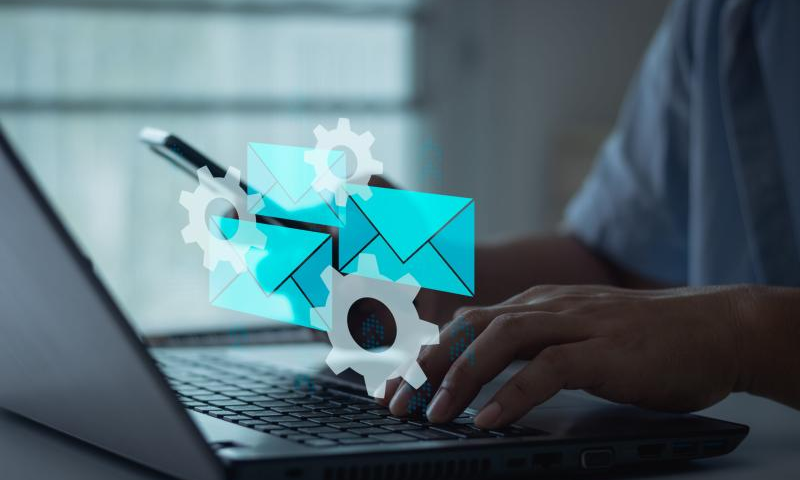
How to Use AI to Automate Lead Generation
January 17, 2025AI Marketing 101: How Algorithms Make Smarter Decisions
January 20, 2025
In today’s digital age, email marketing remains one of the most powerful tools for engaging customers and driving business growth. However, with inboxes flooded with promotional emails daily, capturing your audience’s attention has never been more challenging. The solution? Personalization. And when it comes to personalization at scale, artificial intelligence (AI) is your secret weapon.
AI tools have revolutionized the way businesses approach email campaigns, allowing marketers to craft hyper-personalized experiences that resonate with recipients on a deeper level. In this blog post, we’ll explore how AI tools can supercharge your email campaigns, dive into specific features they offer, discuss best practices, and highlight emerging trends shaping the future of AI-powered email marketing.
The Power of Personalization in Email Marketing
Personalization is no longer optional—it’s expected. According to a study by Statista, emails with personalized subject lines are 26% more likely to be opened. Furthermore, tailored content increases click-through rates, reduces unsubscribes, and fosters customer loyalty.
But here’s the challenge: manually personalizing emails for hundreds or thousands of recipients is time-consuming and prone to errors. That’s where AI steps in, automating and optimizing personalization efforts to deliver:
- Relevant Content: AI analyzes customer data to determine the most appropriate content for each recipient.
- Perfect Timing: AI identifies the optimal time to send emails based on user behavior.
- Dynamic Segmentation: AI creates audience segments based on real-time insights, ensuring your messaging is always relevant.
How AI Enhances Email Campaigns
AI tools integrate advanced technologies like machine learning, natural language processing (NLP), and predictive analytics to make email marketing smarter and more effective. Here’s how:
1. Behavioral Analysis
AI analyzes customer behaviors, such as browsing history, past purchases, and email interactions, to predict future actions. For instance, if a customer frequently browses tech gadgets, the AI can prioritize sending tech-related offers or updates.
2. Smart Segmentation
Traditional segmentation groups audiences by static criteria like age or location. AI-driven segmentation goes deeper, grouping recipients based on interests, preferences, and behaviors, enabling ultra-targeted campaigns.
3. Dynamic Content Creation
AI enables the creation of dynamic email templates that adapt to individual users. This means that two people opening the same email might see entirely different content based on their preferences and past interactions.
4. Predictive Analytics
AI can forecast future customer behaviors, such as predicting who is most likely to open, click, or convert. This insight helps marketers prioritize high-potential leads.
5. Optimized Send Times
AI determines the best time to send emails based on when each recipient is most likely to engage. This ensures your email doesn’t get lost in the shuffle of their busy inbox.
6. Subject Line Optimization
AI tools can analyze past campaigns and suggest subject lines that are most likely to boost open rates. NLP enables AI to craft emotionally engaging and curiosity-piquing subject lines.
7. Hyper-Personalized Recommendations
By integrating with e-commerce platforms, AI can suggest products or services tailored to individual recipients based on their browsing and purchase history.
8. Automated A/B Testing
AI simplifies the process of A/B testing by automatically testing multiple variables (like subject lines, content, and visuals) and selecting the best-performing combinations in real-time.
9. Improved Retargeting Campaigns
AI-powered retargeting ensures that follow-up emails are highly relevant and contextually appropriate, boosting conversion rates.

Top AI Tools for Personalizing Email Campaigns
Here are some of the leading AI tools that can help you take your email campaigns to the next level:
1. Mailchimp
Known for its user-friendly interface, Mailchimp uses AI to offer advanced segmentation, personalized product recommendations, and predictive analytics. Its AI Assistant even helps craft email copy and subject lines.
2. ActiveCampaign
ActiveCampaign excels in dynamic content personalization and behavior tracking. Its AI-powered automation workflows ensure that each customer receives highly relevant emails at the right time.
3. HubSpot
HubSpot’s AI tools provide smart content recommendations and email scheduling. Its advanced CRM integration ensures a seamless flow of data for hyper-targeted campaigns.
4. Seventh Sense
Focused on send-time optimization, Seventh Sense’s AI analyzes recipient behavior to determine the best times to send emails for maximum engagement.
5. Persado
Persado specializes in AI-generated content, helping marketers craft emotionally resonant subject lines and email body text that drive action.
6. Zeta Global
Zeta’s AI engine uses customer intent data to deliver personalized email experiences. It’s particularly strong in predictive analytics and real-time engagement.
7. Phrasee
Phrasee’s AI generates email subject lines, headers, and body content that align with your brand voice while optimizing for conversions.
8. Drift Email
Drift’s conversational AI focuses on automating responses and follow-ups, ensuring no leads slip through the cracks.
Real-World Success Stories
Case Study 1: E-commerce Brand Boosts Sales by 30%
An online fashion retailer used AI-powered segmentation and predictive analytics to identify customers most likely to purchase during seasonal sales. By sending tailored recommendations, they achieved a 30% increase in sales.
Case Study 2: SaaS Company Reduces Churn
A SaaS company leveraged AI tools to analyze user behavior and identify customers at risk of churning. By sending personalized re-engagement emails, they reduced churn by 15% within three months.
Case Study 3: Nonprofit Increases Donations
A nonprofit organization used AI-driven email personalization to target donors with messages tailored to their giving history. This strategy resulted in a 20% increase in donations during their annual fundraising campaign.

Emerging Trends in AI-Powered Email Marketing
The landscape of AI-driven email marketing is rapidly evolving. Here are some trends to watch:
- AI-Powered Visual Content: Tools that generate personalized visuals, such as product images tailored to the recipient’s preferences.
- Voice Integration: AI-driven emails optimized for voice assistant compatibility, allowing users to interact with emails via voice commands.
- Real-Time Personalization: Emails that update content dynamically at the time of opening, ensuring the message is always relevant.
- Sentiment Analysis: AI tools that gauge the emotional tone of emails and adjust messaging accordingly to improve engagement.
- Multilingual Personalization: AI tools that automatically translate and localize email content based on the recipient’s language and cultural context.
Best Practices for Using AI in Email Personalization
To maximize the benefits of AI, follow these best practices:
- Leverage Quality Data: AI is only as good as the data it uses. Ensure your customer data is accurate, up-to-date, and comprehensive.
- Test and Optimize: Use A/B testing to evaluate the effectiveness of AI-generated content and refine your approach.
- Blend AI with Human Creativity: While AI is powerful, overly robotic emails can alienate customers. Combine AI insights with human storytelling.
- Respect Privacy and Compliance: Ensure your email campaigns comply with data protection regulations like GDPR and CCPA to maintain customer trust.
- Monitor Performance Metrics: Continuously analyze open rates, click-through rates, and conversion metrics to refine your strategies.
The Future of AI in Email Marketing
AI is continuously evolving, and its applications in email marketing are only set to grow. Emerging trends include:
- Hyper-Personalization at Scale: AI will enable one-to-one email personalization for millions of users simultaneously.
- AI-Powered Customer Journeys: Enhanced AI models will provide a more holistic view of the customer journey, optimizing every touchpoint.
- Proactive Email Automation: AI will anticipate customer needs and send proactive, value-driven emails before customers even realize they need them.
- Sustainability in Email Campaigns: AI will help optimize email frequency and content to reduce digital clutter and improve sustainability.
Conclusion
AI tools are transforming email campaigns from generic broadcasts to highly personalized experiences that delight recipients and drive results. By leveraging AI, businesses can not only enhance engagement but also build stronger, more meaningful relationships with their audiences.
The future of email marketing lies in personalization powered by AI. Are you ready to embrace this transformative technology? Start exploring AI-powered tools today and unlock the full potential of your email campaigns.


